Truthdigger of the Week: Bidhya Devi Bhandari, Nepal’s First Female President
Bhandari’s pro-democracy campaigning is helping to end the oppressive legacies of a monarchy that lasted 240 years in the country she now heads.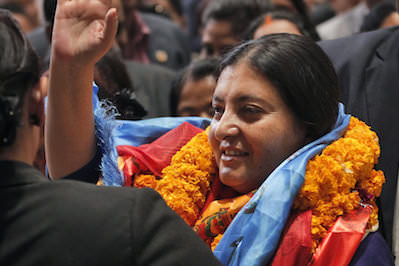 Bidhya Devi Bhandari of the Communist Party of Nepal Unified Marxist-Leninist after she was elected Nepal's president on Wednesday. (Niranjan Shrestha / AP)
Bidhya Devi Bhandari of the Communist Party of Nepal Unified Marxist-Leninist after she was elected Nepal's president on Wednesday. (Niranjan Shrestha / AP)
Every week the Truthdig editorial staff selects a Truthdigger of the Week, a group or person worthy of recognition for speaking truth to power, breaking the story or blowing the whistle. It is not a lifetime achievement award. Rather, we’re looking for newsmakers whose actions in a given week are worth celebrating.
Feminists and leftists in general are celebrating progress in Nepal after the South Asian country’s Parliament elected Bidhya Devi Bhandari president on Wednesday. She is the first female president in a region with few female political leaders.
After 240 years as a Hindu monarchy, Nepal became a secular republic in 2008 after its final king relinquished sovereign power to the public in response to a pro-democracy movement that gained force in 2006. The presidency is a ceremonial office, but with the election of the 54-year-old Bhandari—a longtime campaigner for democracy and female equality and former deputy leader of the country’s Communist Party—Nepal has gained a credible moral leader as a figurehead.
Indeed, the new constitution, which Bhandari is credited with having helped shape, requires the president or vice president and one-third of Nepal’s Parliament to be female.
Reporting from the Nepalese capital of Kathmandu, journalist Binaj Gurubacharya writes that “Nepal has been trying to shift from a male-dominated society, where women are mostly limited to working at homes or on farms, to one in which women have equal opportunities and legal rights. […] Ms Bhandari said her election marked a first step toward assuring the new constitutional ‘guarantees of equality’ are fulfilled.”
Just a week before Bhandari’s election, the Parliament also elected its first female speaker.
Bhandari succeeds President Ram Baran Yadav, who was elected in 2008 and whose efforts to draft a new constitution stalled over seven years. Bhandari, who was recommended for the position by Prime Minister Khadga Prasad Sharma Oli, became a leading political figure when her husband, the popular Communist leader Madan Bhandari, was killed in a car crash in 1993. His death was reported as an accident with no eyewitnesses. Before his funeral, “streams of people” were said to have visited the place where his body was kept, with mourners arriving “day and night with tears in their eyes.”
The changes to Nepal’s constitution have not come without challenge. Minorities in the country’s south have alleged discrimination and protested new laws blocking a key border crossing with India. India supplied all of Nepal’s fuel before a new contract was recently arranged with China. Forty-eight of the country’s 597 lawmakers did not participate in the vote that elected Bhandari because they oppose the new constitution. And Bhandari herself is not without critics. Central to their concerns is her support for a citizenship law that bars single Nepali mothers and women married to foreigners from passing citizenship on to their children.
These concerns notwithstanding, Bhandari’s election and the pro-equality policies she helped establish mark significant progress for a nation that was a dictatorship just eight years ago. For the service she has provided to women and the population in general, Bidhya Devi Bhandari is our Truthdigger of the Week.
Your support matters…Independent journalism is under threat and overshadowed by heavily funded mainstream media.
You can help level the playing field. Become a member.
Your tax-deductible contribution keeps us digging beneath the headlines to give you thought-provoking, investigative reporting and analysis that unearths what's really happening- without compromise.
Give today to support our courageous, independent journalists.
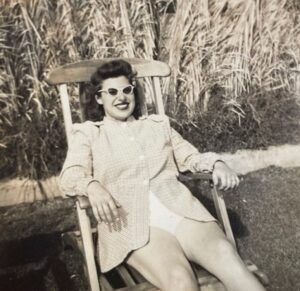
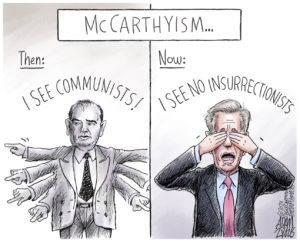

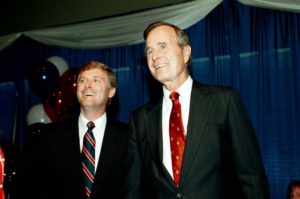
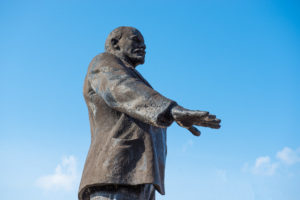
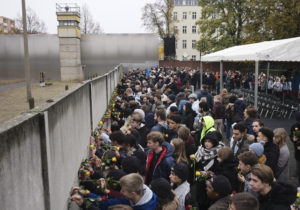
You need to be a supporter to comment.
There are currently no responses to this article.
Be the first to respond.